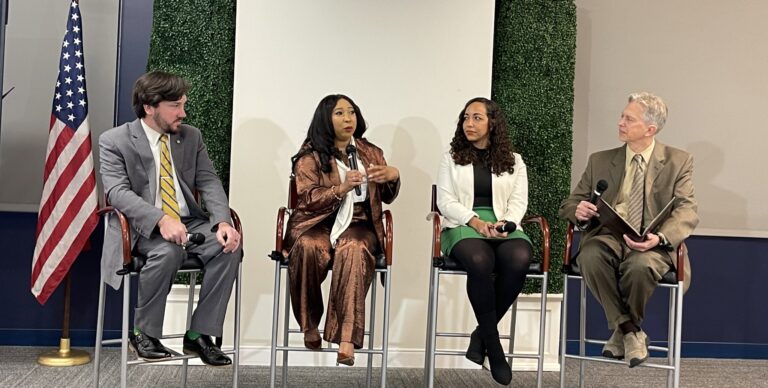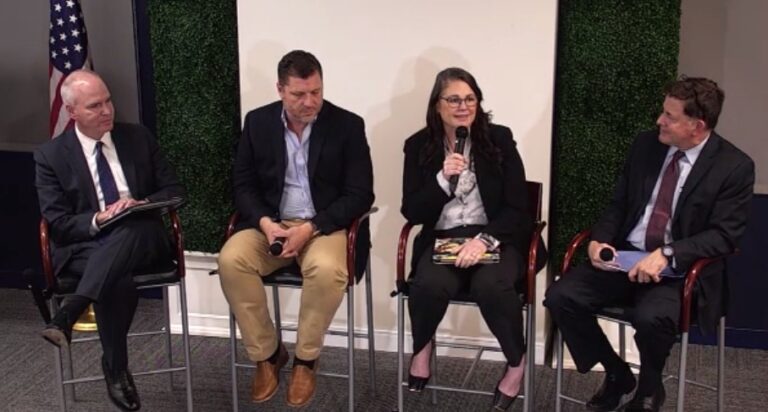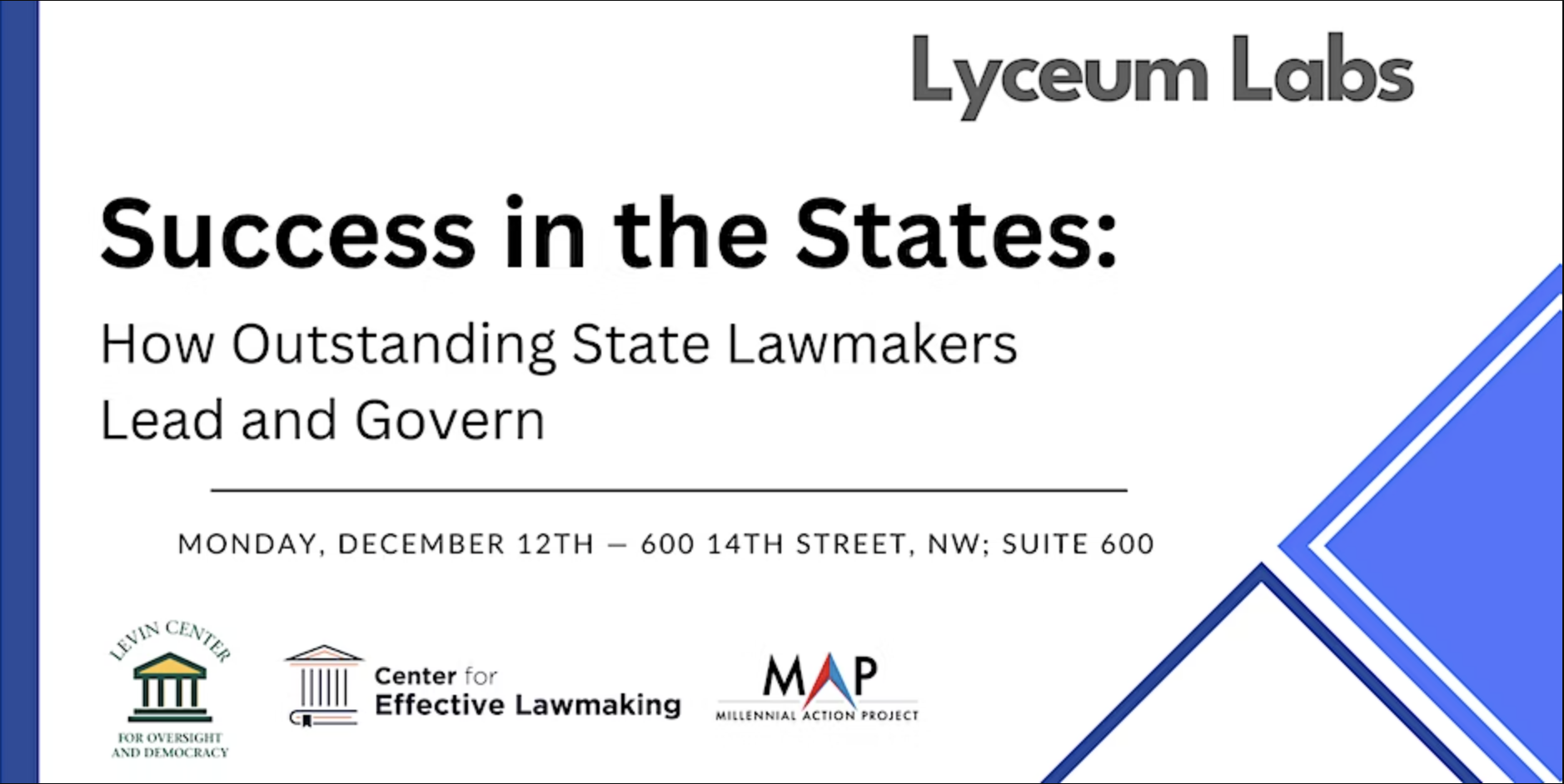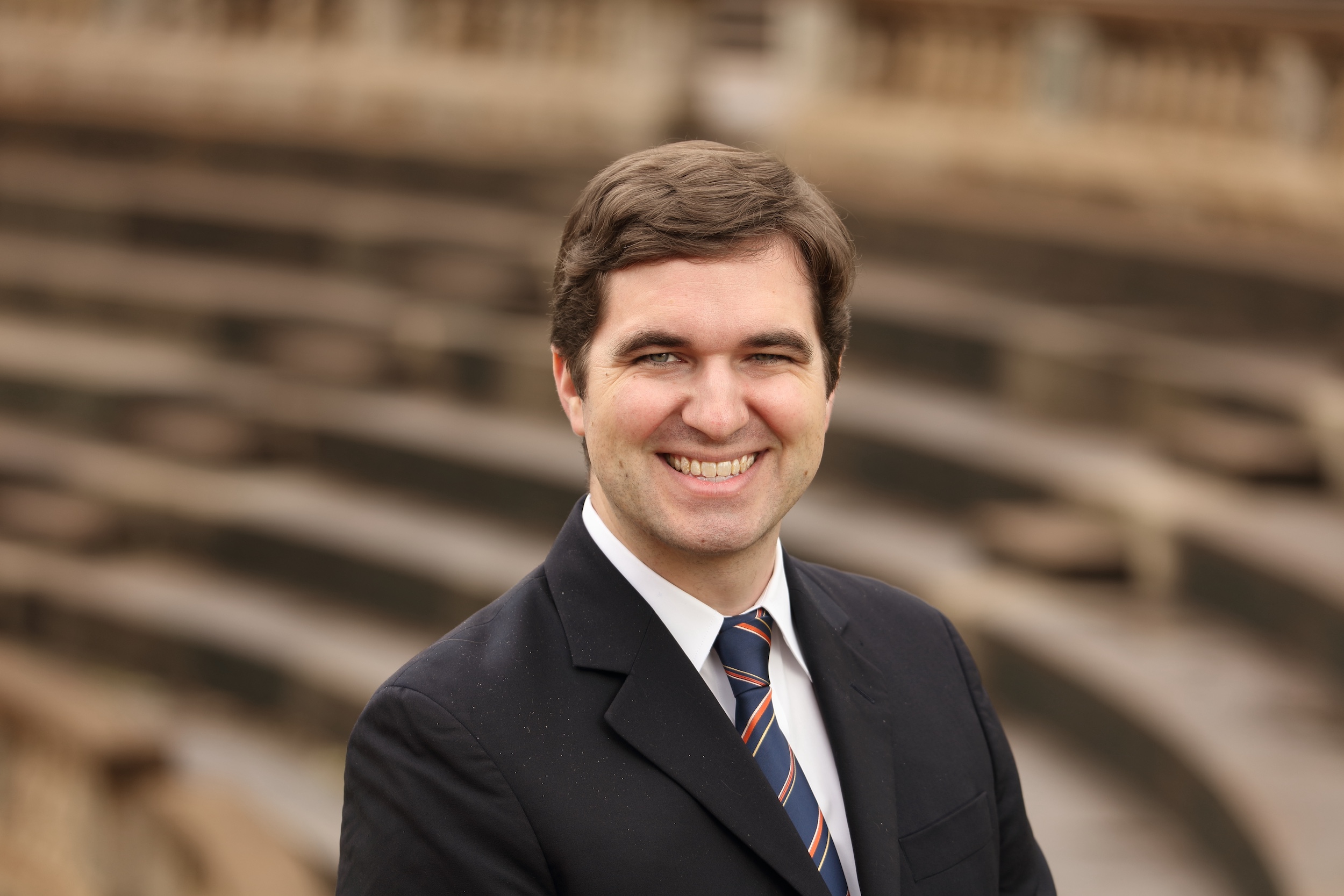Success in the States: How Outstanding State Lawmakers Lead and Govern
On Monday, December 12, the Center for Effective Lawmaking (CEL), along with the Levin Center for Oversight and Democracy, Lyceum Labs, and the Millennial Action Project (MAP), cohosted the event “Success in the States: How Outstanding State Lawmakers Lead and Govern” in Washington, DC. The forum brought together a bipartisan group of state lawmakers and nonprofit leaders dedicated to supporting better political leadership in the U.S. to reflect on the issues at stake for our democracy. The participants spoke about their experiences and research, and provided valuable insights into how legislators can achieve success on the state level.
See below for the video and summary of the event:
Daniel Stid, the Executive Director of Lyceum Labs, provided the opening remarks. He talked about how state legislatures do not get as much attention as their federal counterpart, but they have a major impact on the day-to-day lives of citizens, especially given the increased amount of federal resources recently allotted to state governments. They also have an important role as a training ground since most members of Congress start out on the state level where they learn to succeed – or fail – to represent a constituency and being an effective lawmaker. He concluded by saying he looked forward to hearing from the panelists to learn how more people can follow their examples.

The first panel involved the discussion of “Campaigning, Governing, and Working Across the Aisle,” featuring:
- Senator John Michael Montgomery, Oklahoma State Senate (R)
- Representative Ajay Pittman, Oklahoma State House (D)
- Layla Zaidane, President and CEO, Millennial Action Project
- Craig Volden, Co-director, Center for Effective Lawmaking (Moderator)
Professor Volden asked about the challenges of being in the state legislature and how they can be overcome. Senator Montgomery and Representative Pittman explained how it was essential to transition from campaigning to governing, but it could be hard since many who are new to the legislature might not know the basic logistics of the job (i.e., how to upload a bill to a computer system). Critically, legislators must acknowledge that “we’ve got to go out and work together”; this requires finding common ground with people where “you may not have liked their talking points on their campaign, but you guys are church members or you have the same type of dog.” They said that a way to overcome the transition is ensure there is a support system so all legislators have the tools and connections they need to do their jobs as well as make sure they are healthy from a personal standpoint and are supporting each other. Zaidane added that MAP was working to help establish a playbook for these issues and deliver the best results for lawmakers and their communities.
Senator Montgomery and Representative Pittman are also co-chairs of their State Future Caucus, an initiative of MAP that brings together a bipartisan coalition of young legislators to work on issues facing Gen Z, Millennials, and future generations. They said the caucus allowed them to connect with people through social events like happy hours and book clubs so they could establish relationships with people who could help them focus on topics like expanding broadband internet and addressing food deserts; by having bipartisan support, it gave their bills a better chance of succeeding. The lawmakers and Zaidane tied this to the larger issue of needing to have relationships and trust in each other in order to get things done (“there is no shortcut to getting trust”).
When discussing advice for individual members, the participants emphasized taking initiative. The legislators said they have seen instances where their colleagues would not understand the process, get frustrated by it, and give up. They recommended taking advantage of every networking opportunity available to them (i.e., attending receptions) and gain knowledge about specific topics as well as other legislators, because if people got to know them and the issues they care about, they will respect and try to help them They also encouraged specialization – there are many different issues and it can be counterproductive as a lawmaker to spread yourself too thin. They said it would be best to focus on select issue areas where you can get things done, but even if an initiative fails to gain traction, a lawmaker should not give up on it since they may have a chance to come back to it later.

The second panel involved the discussion of “Effective Lawmaking and Oversight in the States,” featuring:
- Former Senator Jeff Brandes, Florida State Senate (R)
- Senator Sara Gelser Blouin, Oregon State Senate (D)
- Jim Townsend, Director, Levin Center for Oversight and Democracy (Moderator)
- Alan Wiseman, Co-director, Center for Effective Lawmaking
Townsend started the conversation by asking how the legislators were able to work on bills that were important to constituents and those that initially seemed hard to pass. Senators Brandes and Gelser Blouin spoke about their individual initiatives, from default parenting time plans to fighting discrimination against COVID patients with disabilities. Individually, they recommended legislators should “pick a topic …and learn it better than anybody else” to make themselves indispensable (it would also ideally be related to a committee they sit on). They also said it was important to follow basic procedures, such as reading the bills you craft for errors, to make everything as perfect as possible before negotiations and focusing on the broader goals.
Like the last panel, the legislators emphasized the importance of bipartisanship and working across the aisle to get past deeply-held biases to find common ground (“there are no permeant friends and there are no permanent enemies in politics”). By doing this type of work, you show you are “caring about the issue and not caring about…how we get there.” This particularly extended to committee chair in that they should lay out what they wanted the outcome of legislation to be first before beginning the process. Different working environments play a role as well – you may attack each other during a campaign, but you work together while governing. Importantly, lawmakers need to understand that people are passing bills they care about even if you disagree with them and to maintain those relationships despite those disagreements.
The advice given by the lawmakers extended to issues of oversight (as researched by the Levin Center). For instance, a legislator needs to be an expert on what they are overseeing or at least be in touch with people who have deeper knowledge of it. They then need to go into the process of deciding if a case is worth pursing, and reaching out to the right agencies and communicating their objectives to a wider audience. Oversight needs to be bipartisan in order to keep the two parties accountable, as well as to get more attention and accountability from the media and public, so maintaining relations across the aisle is essential for the process.
The CEL is proud to have cohosted this event with a distinguished group of leaders, and looks forward to future collaboration with them.



